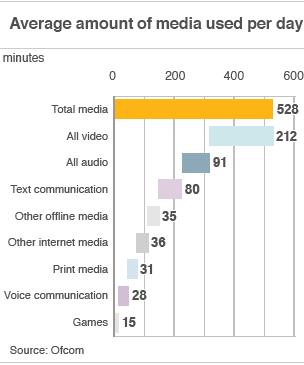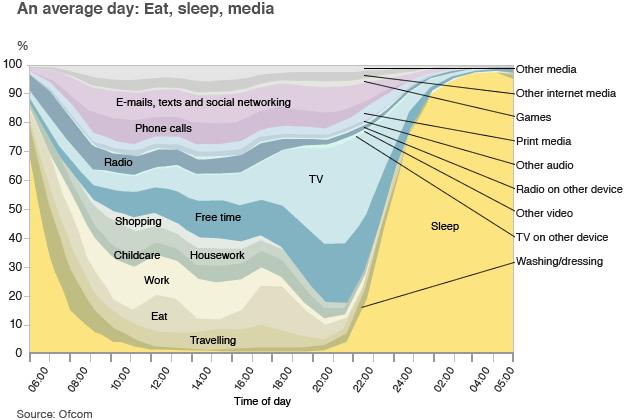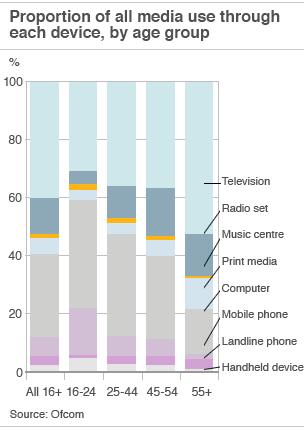Ofcom report highlights 'multi-tasking media users'
- Published
How do you use technology? Ofcom says older people are catching up on the young.

The average Briton spends almost half their waking life using media and communications, data suggests.
The statistics from regulator Ofcom suggest people in the UK spend seven hours a day watching TV, surfing the net and using their mobile phones.
However, the average person actually squeezes in the equivalent of nearly nine hours of media and communications by multi-tasking on several devices.
The statistics come from industry sources and a survey of 1,138 adults.
The report also suggests that traditional media are holding their own.
Television still dominates people's media habits, with the average person spending around 3.8 hours watching television every day, it says.
"For the first time we have mapped the totality of communications use over one day," said Peter Philips of Ofcom.
The annual Communications Market Report, external says the average person spends about 15 hours 45 minutes every day awake. Of this time, it says, the average person spends seven hours and five minutes "engaging in media and communications activities".
However, it found that most people are able to cram in even more by multi-tasking. For example, the report found that adults aged between 16 and 24 appeared to consume the least, spending just six hours and 35 minutes a day on the phone, laptop, radio or television.

But by multitasking - effectively using two or more devices at once - the survey found that young adults were able to squeeze the equivalent of nine hours 32 minutes worth of consumption into that time.
"They are taking up more and more communications activities but fitting them into the same amount of time," said James Thickett, director of market research and market intelligence at Ofcom.
He said this was largely due to the rise in the mobile internet and the use of smartphones.
"It has untethered people from being in one particular place."
The report says that the number of people using their phone to surf the web currently stands at 13.5m people. This has almost tripled since 2008, when the figure stood at 5.7m.
Concurrently, the use of mobile data has exploded, the report said, increasing by 240% between 2007 and 2009.
It suggested that, in part, much of this increase had been driven by one site - Facebook - which accounts for 45% of all mobile web use in the UK, followed by Google at 8%.
"All of the others have less than 4% market share," said Mr Philips.
Radio star
Facebook also dominates fixed line broadband use. The report says that social networking now accounts for nearly one-quarter of all time spent online, with Facebook accounting for the majority of traffic.

The majority of users of the site - and other networks - are between 16 and 34, although Ofcom said that there was a growing trend for older people to also sign up to the services.
The report also mapped the current state of broadband in the UK.
It suggests that internet take-up has now reached 73% in the UK, the majority of which is fixed broadband.
But despite the rise in new ways of accessing content, the report says that traditional media, such as TV and radio still dominate people's media habits,.
"TV still plays a central role in people's lives," said Mr Thickett. "We are watching more than at any time in the last five years."
Yet, despite the growth in online TV services and devices that allow people to record television, most shows were watched via traditional live broadcasts.
Radio also held its own, the survey said.
Although listening has gone down slightly, the number of people able to access radio services was at an all time high, at 91%.
"It is still a very important medium for people," said Mr Thickett.
- Published15 July 2010
- Published27 July 2010